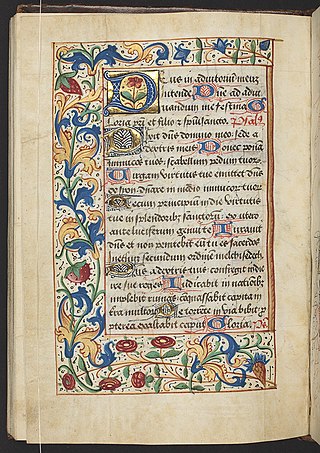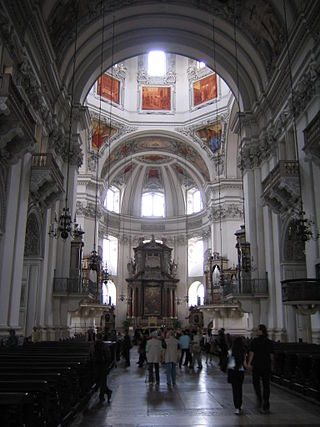
Giuseppe Ottavio Pitoni was an Italian organist and composer. He became one of the leading musicians in Rome during the late Baroque era, the first half of the 18th century.
Johann Ernst Eberlin was a German composer and organist whose works bridge the baroque and classical eras. He was a composer of church organ and choral music. Marpurg claims he wrote as much and as rapidly as Alessandro Scarlatti and Georg Philipp Telemann, a claim also repeated by Leopold Mozart - though Eberlin did not live nearly as long as either of those two composers.
Francesco Scarlatti was an Italian Baroque composer and musician and the younger brother of the better known Alessandro Scarlatti.

Israel in Egypt, HWV 54, is a biblical oratorio by the composer George Frideric Handel. Most scholars believe the libretto was prepared by Charles Jennens, who also compiled the biblical texts for Handel's Messiah. It is composed entirely of selected passages from the Old Testament, mainly from Exodus and the Psalms.

The Funeral Anthem for Queen Caroline, HWV 264, is an anthem by George Frideric Handel. It was composed and first performed for the funeral of Caroline of Ansbach at Westminster Abbey on 17 December 1737. Handel slightly re-worked the anthem and used it for the opening section of his oratorio Israel in Egypt in 1739. The theme of the first chorus was taken by Mozart as the theme for the Requiem aeternam movement of his Requiem Mass. The anthem is approximately forty minutes in length.
A coronation anthem is a piece of choral music to accompany the crowning of a monarch. Many composers have written such works. Being anthems, they are not hymns but textured motets requiring a trained choir.
Nisi Dominus is a setting of the Latin text of Psalm 127 by George Friederic Handel. The name of the piece comes from the first two words of the psalm, and it is catalogued in the composer's complete works as HWV 238. It was completed by 13 July 1707, and is one of a number of works he composed in Italy. It is most likely that Nisi Dominus was first performed on 16 July 1707 in the church of Santa Maria in Montesanto, Rome, under the patronage of the Colonna family.
Salve Regina is an antiphon composed by George Friederic Handel around 1707. It is most likely that the work was first performed for Trinity Sunday in Vignanello on 19 July 1707 in the Church of Santa Maria in Montesanto, under the patronage of the Colonna family. Other catalogues of Handel's music have referred to the work as HG xxxviii, 136.

Vesperae solennes de Dominica, K. 321, is a sacred choral composition, written by Wolfgang Amadeus Mozart in 1779. It is scored for SATB choir and soloists, violin I and II, 2 trumpets, 3 trombones colla parte, 2 timpani, and basso continuo.
As pants the hart is an anthem composed by George Frideric Handel for the Chapel Royal of Queen Anne and subsequently revised. There are five versions of the work, the first being completed in 1713, and the final in 1738. HWV 251a was the first anthem Handel composed for the Chapel Royal.

Psalm 96 is the 96th psalm of the Book of Psalms, a hymn. The first verse of the psalm calls to praise in singing, in English in the King James Version: "O sing a new song unto the Lord". Similar to Psalm 98 and Psalm 149, the psalm calls to praise God in music and dance, because he has chosen his people and helped them to victory. It is one of the royal psalms praising God as the King of His people.

Psalm 110 is the 110th psalm of the Book of Psalms, beginning in English in the King James Version: "The LORD said unto my Lord". In the slightly different numbering system used in the Greek Septuagint and Latin Vulgate translations of the Bible, this psalm is Psalm 109. In Latin, it is known as Dixit Dominus. It is considered both a royal psalm and a messianic psalm. C. S. Rodd associates it with the king's coronation.

Psalm 127 is the 127th psalm of the Book of Psalms, beginning in English in the King James Version: "Except the Lord build the house". In Latin, it is known by the incipit of its first 2 words, "Nisi Dominus". It is one of 15 "Songs of Ascents" and the only one among them attributed to Solomon rather than David.

Aure soavi e liete is a Baroque dramatic secular cantata in the key of E-flat major composed by George Frideric Handel in 1707 while he was serving as Kapellmeister to the Ruspoli family in Rome. The author of the text is unknown. Other catalogues of Handel's music have referred to the work as HG l,12. The cantata is scored for solo soprano voice and basso continuo. It is divided into four separate movements with a typical performance lasting approximately seven and a half minutes.

George Frideric Handel's Gloria is a sacred solo cantata, a setting of the Gloria, the liturgical part of the Mass, for soprano and strings. Handel may have composed it in Germany before departing for Italy in 1706. The composition was lost for many years and was attributed to Handel again only in 2001.

Allor ch'io dissi addio is a dramatic secular cantata for soprano written by Georg Frideric Handel in 1707–08. Other catalogues of Handel's music have referred to the work as HG l,8. The title of the cantata translates as "Then I said goodbye".

Vesperae solennes de confessore, K. 339, is a sacred choral composition, written by Wolfgang Amadeus Mozart in 1780. It is scored for SATB choir and soloists, violin I, violin II, 2 trumpets, 3 trombones colla parte, 2 timpani, and basso continuo.
Antonio Vivaldi composed three settings of the Dixit Dominus, the Latin version of Psalm 110. They include a setting in ten movements for five soloists, double choir and orchestra, RV 594, another setting in eleven movements for five voices, five-part choir and orchestra, RV 595, and a recently discovered setting in eleven movements for five soloists, choir and orchestra, RV 807, which had been attributed to Baldassare Galuppi. Dixit Dominus, RV 594, has been regarded as one of Vivaldi's "most significant sacred works".

Chandos Anthems, HWV 246–256, is the common name of a set of anthems written by George Frideric Handel. These sacred choral compositions number eleven; a twelfth of disputed authorship is not considered here. The texts are psalms and combined psalm verses in English. Handel wrote the anthems as composer in residence at Cannons, the court of James Brydges, who became the First Duke of Chandos in 1719. His chapel was not yet finished, and services were therefore held at St Lawrence in Whitchurch. The scoring is intimate, in keeping with the possibilities there. Some of the anthems rely on earlier works, and some were later revised for other purposes.










